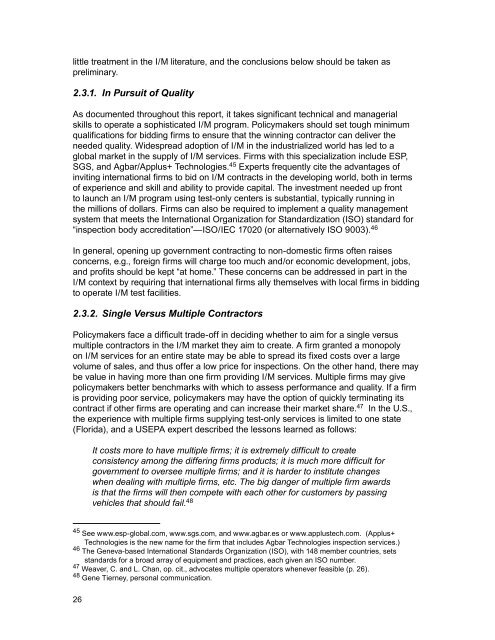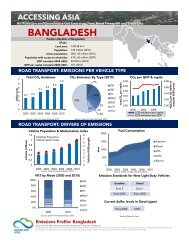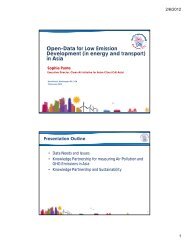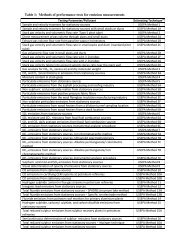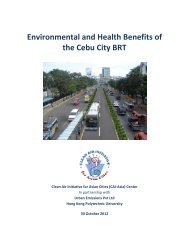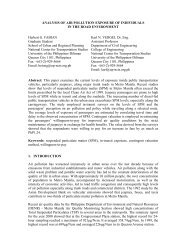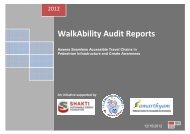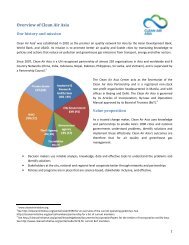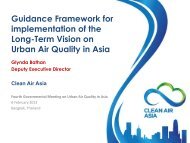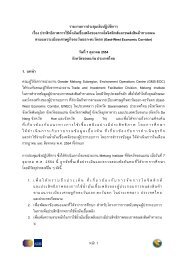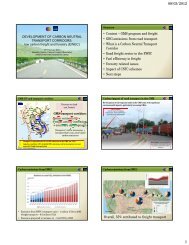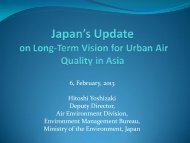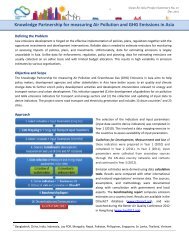International Experience and Best Practices - Clean Air Initiative
International Experience and Best Practices - Clean Air Initiative
International Experience and Best Practices - Clean Air Initiative
You also want an ePaper? Increase the reach of your titles
YUMPU automatically turns print PDFs into web optimized ePapers that Google loves.
little treatment in the I/M literature, <strong>and</strong> the conclusions below should be taken as<br />
preliminary.<br />
2.3.1. In Pursuit of Quality<br />
As documented throughout this report, it takes significant technical <strong>and</strong> managerial<br />
skills to operate a sophisticated I/M program. Policymakers should set tough minimum<br />
qualifications for bidding firms to ensure that the winning contractor can deliver the<br />
needed quality. Widespread adoption of I/M in the industrialized world has led to a<br />
global market in the supply of I/M services. Firms with this specialization include ESP,<br />
SGS, <strong>and</strong> Agbar/Applus+ Technologies. 45 Experts frequently cite the advantages of<br />
inviting international firms to bid on I/M contracts in the developing world, both in terms<br />
of experience <strong>and</strong> skill <strong>and</strong> ability to provide capital. The investment needed up front<br />
to launch an I/M program using test-only centers is substantial, typically running in<br />
the millions of dollars. Firms can also be required to implement a quality management<br />
system that meets the <strong>International</strong> Organization for St<strong>and</strong>ardization (ISO) st<strong>and</strong>ard for<br />
“inspection body accreditation”—ISO/IEC 17020 (or alternatively ISO 9003). 46<br />
In general, opening up government contracting to non-domestic firms often raises<br />
concerns, e.g., foreign firms will charge too much <strong>and</strong>/or economic development, jobs,<br />
<strong>and</strong> profits should be kept “at home.” These concerns can be addressed in part in the<br />
I/M context by requiring that international firms ally themselves with local firms in bidding<br />
to operate I/M test facilities.<br />
2.3.2. Single Versus Multiple Contractors<br />
Policymakers face a difficult trade-off in deciding whether to aim for a single versus<br />
multiple contractors in the I/M market they aim to create. A firm granted a monopoly<br />
on I/M services for an entire state may be able to spread its fixed costs over a large<br />
volume of sales, <strong>and</strong> thus offer a low price for inspections. On the other h<strong>and</strong>, there may<br />
be value in having more than one firm providing I/M services. Multiple firms may give<br />
policymakers better benchmarks with which to assess performance <strong>and</strong> quality. If a firm<br />
is providing poor service, policymakers may have the option of quickly terminating its<br />
contract if other firms are operating <strong>and</strong> can increase their market share. 47 In the U.S.,<br />
the experience with multiple firms supplying test-only services is limited to one state<br />
(Florida), <strong>and</strong> a USEPA expert described the lessons learned as follows:<br />
26<br />
It costs more to have multiple firms; it is extremely difficult to create<br />
consistency among the differing firms products; it is much more difficult for<br />
government to oversee multiple firms; <strong>and</strong> it is harder to institute changes<br />
when dealing with multiple firms, etc. The big danger of multiple firm awards<br />
is that the firms will then compete with each other for customers by passing<br />
vehicles that should fail. 48<br />
45 See www.esp-global.com, www.sgs.com, <strong>and</strong> www.agbar.es or www.applustech.com. (Applus+<br />
Technologies is the new name for the firm that includes Agbar Technologies inspection services.)<br />
46 The Geneva-based <strong>International</strong> St<strong>and</strong>ards Organization (ISO), with 148 member countries, sets<br />
st<strong>and</strong>ards for a broad array of equipment <strong>and</strong> practices, each given an ISO number.<br />
47 Weaver, C. <strong>and</strong> L. Chan, op. cit., advocates multiple operators whenever feasible (p. 26).<br />
48 Gene Tierney, personal communication.


